In today’s world, our dietary choices are about more than just nourishing our bodies—they play a pivotal role in the health of our planet. From the carbon footprint of our meals to the strain on our natural resources, what we put on our plates leaves an indelible mark on the environment.
Sustainable diets have thus garnered significant attention, and for good reason. By understanding and adopting such diets, we can not only benefit our health but also contribute to a brighter future for Earth.
In this article, I’ll dive deep into the essence of sustainable eating, offering insights, tips, and actionable diet plans to guide you on this transformative journey.
What is a Sustainable Diet?
A sustainable diet refers to a pattern of eating that promotes health and well-being for individuals while simultaneously reducing the environmental impact and ensuring food security for current and future generations.
The concept of a sustainable diet integrates nutritional, environmental, economic, and sociocultural dimensions. Some key principles of a sustainable diet include:
Nutritionally Adequate
A sustainable diet should meet individual nutritional needs, ensuring health and well-being.

Low Environmental Impact
It prioritizes the consumption of foods that require fewer natural resources (like water and land) and produce fewer greenhouse gases and pollutants.
Economically Fair
Sustainable diets often support local producers and fair-trade initiatives, ensuring fair prices and wages for those involved in food production.
Culturally Acceptable
Food practices should respect cultural and personal choices. A sustainable diet in one region or culture may look different from another but still adhere to the principles of sustainability.
Accessible
A sustainable diet should be accessible to everyone, regardless of socio-economic status.
Reduce Waste
Minimizing food loss and waste is crucial. This means valuing leftovers, understanding expiration dates, and using or preserving excess food.
Diversified
Diversity in food choices, including a wide variety of plant-based foods, can be more sustainable because it spreads demand across a range of food sources and can lead to a more nutritionally balanced diet.
Shift Towards Plant-Based
Diets rich in plant-based foods (like vegetables, fruits, legumes, nuts, seeds, and whole grains) and lower in red and processed meats are both health-promoting and more sustainable.
Ethical Animal Products
If consuming animal products, it’s preferable to choose those from systems that prioritize animal welfare, use fewer antibiotics, and have lower environmental impacts, like pasture-raised or free-range systems.
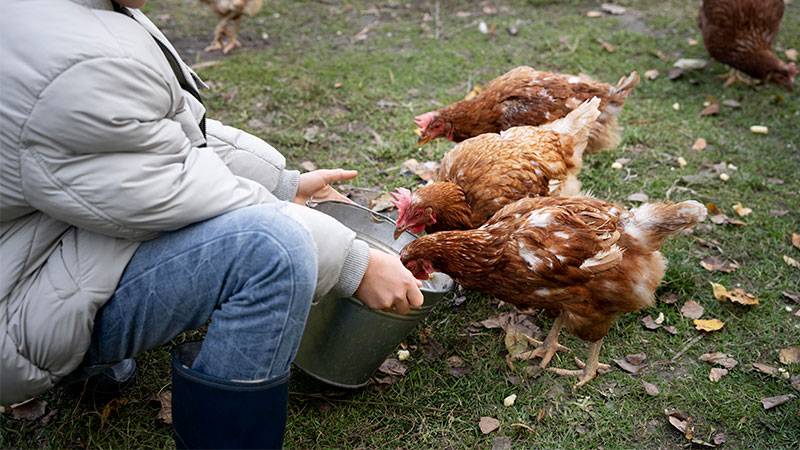
Seasonal and Local
Consuming foods that are in season and produced locally can reduce the environmental footprint associated with transportation and storage.
Water Conservation
Being mindful of the water footprint of our food choices and favoring foods that are less water-intensive.
Chemical Reduction
Opting for foods grown without or with fewer pesticides, herbicides, and synthetic fertilizers can reduce the environmental impact and potential health risks.
How Do You Get Started With a Sustainable Diet?
Starting with a sustainable diet involves a series of informed choices that prioritize both individual health and environmental well-being. Here are some steps to help guide you on this journey:
Educate Yourself
Embarking on a sustainable diet journey starts with knowledge. Delving into the environmental repercussions of our food choices unveils the intricate web of agriculture, consumption, and planetary health. Diverse resources, such as books and documentaries, shed light on how food production affects ecosystems, from water usage to soil health.
Moreover, articles and research papers offer data-driven insights on sustainable agriculture’s nuances, highlighting practices that respect the environment.
By equipping ourselves with this information, we become empowered consumers, able to make informed dietary decisions that honor both our well-being and the planet’s sustainability. Every bite becomes a conscious act of environmental stewardship.
Prioritize Plant-Based Foods
Embracing a plant-based diet is a pivotal step towards sustainability. Vegetables, fruits, legumes, whole grains, nuts, and seeds are not just nutrition powerhouses; they’re also gentler on our planet.
The resources required to produce these foods—water, land, and energy—are significantly less than those for animal-based foods. Livestock farming, for instance, often leads to deforestation, water pollution, and high greenhouse gas emissions.
In contrast, plant-based foods usually yield a smaller carbon footprint and promote biodiversity. By choosing to load our plates predominantly with plant-derived ingredients, we nourish our bodies while ensuring a more sustainable food system for future generations.

Reduce Meat Consumption
The global appetite for meat, particularly red and processed varieties, has notable environmental repercussions. These range from deforestation for livestock pasture to vast amounts of greenhouse gas emissions.
By curbing our meat intake, we can substantially decrease our carbon footprint and ease the strain on valuable resources like water and land.
When the craving for meat does strike, it’s essential to make discerning choices. Opting for sustainably raised or grass-fed meats can make a difference. These practices often align with better animal welfare standards and have a reduced environmental impact, making them a more conscientious choice for both the planet and its inhabitants.
Buy Local and Seasonal
When we choose local produce, we’re not just supporting community farmers, but we’re also making an eco-friendly choice. Local foods haven’t traveled thousands of miles to reach our plates, which means a significant reduction in transportation emissions. Additionally, shorter transport times often translate to fresher, more nutrient-dense foods on our tables.
Seasonality is another facet of sustainable eating. In-season foods are grown in their natural climate conditions, requiring fewer artificial inputs like heating, lighting, or pesticides.
Venturing to local farmers’ markets offers a delightful array of these fresh, seasonal treasures, allowing us to relish flavors at their peak while championing a sustainable ethos.
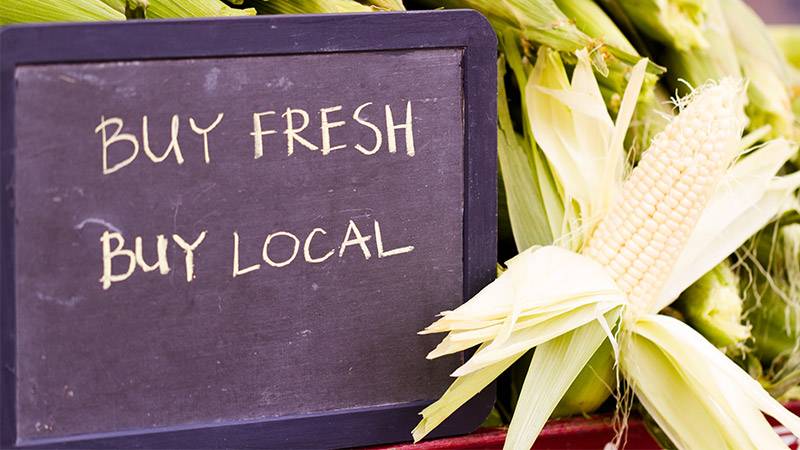
Reduce Food Waste
The colossal issue of food waste has economic, social, and environmental implications. Astonishingly, a third of all food produced globally goes to waste, squandering not only the food itself but also the resources invested in its production.
By meticulously planning our meals and shopping lists, we can purchase only what we need, effectively dodging unnecessary waste.
Effective food storage plays a crucial role in extending freshness and shelf life. Furthermore, repurposing leftovers into new dishes can be both economical and inventive.
By understanding expiration dates and distinguishing between “sell-by” and “use-by”, we can optimize consumption and drastically reduce wastage, forging a more sustainable food journey.
Choose Sustainable Seafood
The oceans, teeming with diverse marine life, are under threat due to overfishing and harmful fishing practices. Many popular seafood choices are sourced from dwindling populations, creating an ecological imbalance.
Opting for sustainably harvested seafood means choosing species that are abundant and fished or farmed with minimal impact on the environment and other marine species.
Utilizing resources, like the Monterey Bay Aquarium’s Seafood Watch, offers invaluable guidance for consumers. These guides classify seafood into categories based on sustainability, helping individuals make informed choices.
By selecting green-rated “Best Choices” or even yellow-rated “Good Alternatives,” we can enjoy our seafood meals with the assurance of ecological responsibility.

Limit Ultra-Processed Foods
The allure of convenience and long shelf life has driven the proliferation of ultra-processed foods in our diets. Yet, beneath the surface of these seemingly convenient options lies a heavy environmental toll.
The production of such foods requires extensive processing, which consumes significant amounts of energy and water. Moreover, the myriad of additives, many derived from non-renewable resources, further exacerbate their environmental footprint.
Packaging adds another layer of concern. Ultra-processed foods often come encased in single-use plastics and materials that contribute to the growing waste problem. By curbing our intake of these foods, we not only make a health-conscious decision but also take a stand for our planet, opting for more naturally derived and minimally processed alternatives.
Grow Your Own
There’s an unparalleled satisfaction in watching a seed sprout, grow, and ultimately bear fruit under your care. Cultivating your own garden, even if it’s just a modest collection of pots, bridges the gap between urban living and nature.
By growing our own produce, we eliminate transportation emissions and packaging waste, making our food’s journey from farm to table as short as a few steps.
Additionally, personal gardens give us control over the farming methods. Without the pressure of commercial yields, we can avoid harmful pesticides and synthetic fertilizers, opting instead for organic and sustainable practices. Even a balcony adorned with flourishing herbs or sun-ripened tomatoes contributes to a more self-sufficient and environmentally conscious lifestyle.
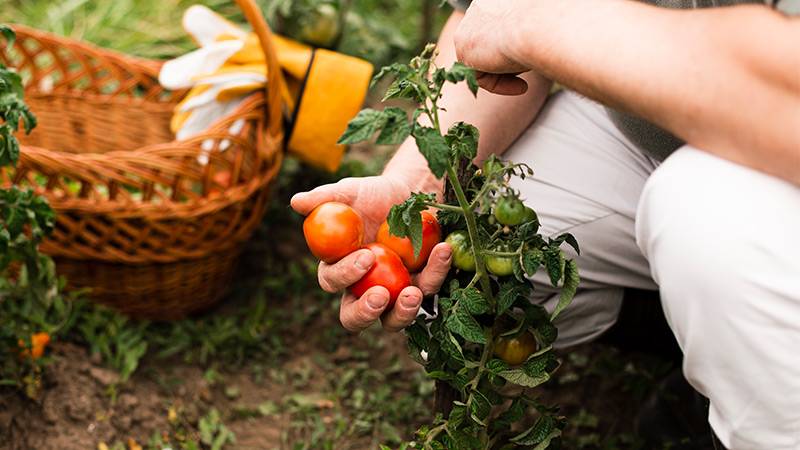
Support Sustainable Farmers
In the vast world of agriculture, there are farmers and brands that have chosen the path less traveled – a commitment to practices that respect the Earth and its intricate ecosystems.
By buying from these champions of sustainability, we’re not only getting nutrient-rich, chemical-free produce but also supporting an agricultural system that prioritizes the planet’s long-term health over short-term yields.
Farming methods like organic, biodynamic, permaculture, and regenerative agriculture are all rooted in the ethos of working harmoniously with nature. These practices enhance soil fertility, promote biodiversity, and reduce the need for chemical interventions.
As consumers, when we choose to financially back these sustainable methods, we’re casting a vote for a greener, healthier, and more equitable food system for future generations.
Stay Hydrated Sustainably
Water is fundamental to our well-being, but the way we source it can have profound environmental implications. The bottled water industry is linked with significant plastic pollution, given that many bottles are not recycled and end up in landfills or oceans.
Additionally, the production and transportation of bottled water contribute to greenhouse gas emissions. By switching to tap water, where it’s safe, we significantly reduce these environmental impacts.
Yet, water quality varies across regions. In areas where tap water might have contaminants or an off taste, water filters can be an invaluable asset. A good filtration system ensures we get clean, safe water without the environmental footprint of disposable plastic bottles. It’s a sustainable choice that prioritizes both our health and the planet’s well-being.

Reduce Dairy or Opt for Alternatives
The dairy industry, with its vast expanses of grazing land and high water usage, has undeniably weighty environmental ramifications. The methane emissions from cows, in particular, are a significant contributor to greenhouse gases.
While dairy has been a staple for many, reevaluating its prominence in our diets can lead to a more sustainable consumption pattern.
Fortunately, modern innovations have ushered in an era of diverse and delicious dairy alternatives. Plant-based milks, derived from sources like almonds, soybeans, oats, and coconuts, offer a refreshing substitute with typically lower environmental footprints.
By transitioning to these alternatives or even just reducing dairy consumption, we can enjoy creamy textures and flavors while lessening our environmental impact.
Join a Community Supported Agriculture (CSA) Program
CSAs represent a burgeoning movement in sustainable food consumption. They offer a symbiotic relationship between farmers and consumers. By participating, individuals pay upfront for a season’s worth of produce, providing farmers with the necessary capital for cultivation and reducing the uncertainties often linked with traditional farming.
The benefits extend beyond just economics. CSA members receive fresh, seasonal produce that hasn’t journeyed long distances, ensuring peak flavor and nutrition.
The direct connection between farmer and consumer fosters a sense of community and appreciation for the labor and love behind every bite. Embracing a CSA not only supports local agriculture but also reconnects us with the very roots of our food.
Top 8 Sustainable Diet Plans
Mediterranean Diet
The Mediterranean Diet, inspired by the traditional eating patterns of countries bordering the Mediterranean Sea, emphasizes whole foods such as vegetables, fruits, legumes, whole grains, nuts, and olive oil. It permits moderate fish and poultry consumption and limits red meat.
From an environmental perspective, the diet’s plant-centric focus means reduced greenhouse gas emissions, less water usage, and lower land exploitation compared to diets heavy in meat.
Health-wise, it has been linked to myriad benefits including reduced risk of heart disease, stroke, and certain cancers. Rich in fiber, antioxidants, and healthy fats, the Mediterranean Diet promotes overall well-being while also championing sustainability.
Planetary Health Diet
The Planetary Health Diet, proposed by the EAT-Lancet Commission, advocates a shift towards plant-based foods, emphasizing nuts, legumes, and whole grains, while limiting meat, dairy, and sugars.
Environmentally, this diet aids in reducing greenhouse gas emissions, curbing deforestation, and conserving biodiversity by decreasing reliance on resource-intensive animal farming. Simultaneously, it champions sustainable agriculture, safeguarding soil and water ecosystems.
Health-wise, the diet is designed to diminish risks of chronic diseases such as heart ailments and diabetes by promoting nutrient-rich, minimally processed foods, offering a unified solution to global health and sustainability challenges.
Flexitarian Diet
The Flexitarian Diet is a balanced approach to eating that emphasizes plant-based foods while allowing occasional consumption of meat and dairy. The primary focus is on vegetables, fruits, legumes, and whole grains, but unlike strict vegetarian or vegan diets, it grants the flexibility to indulge in animal products in moderation.
Environmentally, this diet reduces the ecological footprint associated with heavy meat consumption, leading to decreased greenhouse gas emissions, water usage, and land exploitation.
On the health front, the predominance of plant-based foods provides essential nutrients, fiber, and antioxidants, which contribute to reduced risks of chronic diseases, obesity, and heart ailments, promoting overall well-being.
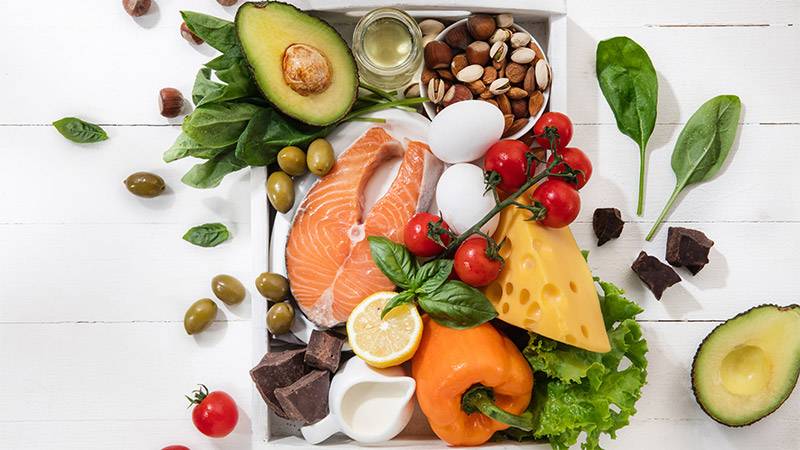
New Nordic Diet
The New Nordic Diet, inspired by the culinary traditions of Nordic countries, prioritizes whole foods like fish, berries, root vegetables, legumes, and whole grains. It emphasizes the consumption of local, seasonal, and organic produce, mirroring the Mediterranean Diet but with a northern twist.
Environmentally, this diet champions sustainable farming practices, promoting biodiversity and reducing transportation emissions due to its emphasis on local sourcing.
Health-wise, the high intake of omega-rich fish, antioxidant-abundant berries, and nutrient-dense vegetables supports heart health, cognitive function, and overall well-being. The diet’s balanced approach intertwines both environmental responsibility and healthful eating in a region-specific context.
Blue Zones Diet
The Blue Zones Diet is inspired by regions globally where people live exceptionally long, healthy lives. Centered on a predominantly plant-based regimen, it emphasizes beans, whole grains, vegetables, fruits, and a minimal intake of meat. These zones, often detached from industrialized food systems, inherently support sustainable, local agriculture.
Environmentally, the focus on plant-based foods means reduced greenhouse gas emissions, water usage, and land depletion compared to meat-heavy diets.
Health benefits are profound, with individuals in Blue Zones experiencing lower rates of chronic diseases, obesity, and heart issues. By mimicking these naturally occurring diets, one can achieve both environmental and healthful harmony.
Vegetarian Diet
A Vegetarian Diet omits all forms of meat, focusing instead on plant-based foods such as vegetables, fruits, legumes, nuts, seeds, and grains. Some variations include dairy and eggs, offering additional protein sources.
From an environmental perspective, eschewing meat significantly reduces water consumption, land degradation, and greenhouse gas emissions inherent in livestock production.
Health benefits are numerous; a well-balanced vegetarian diet is rich in essential nutrients, fiber, and antioxidants, which are instrumental in reducing risks of heart diseases, certain cancers, and diabetes. By eliminating meat, vegetarians not only tread lightly on the planet but also invest in long-term health and well-being.
Vegan Diet
A Vegan Diet strictly excludes all animal-derived products, encompassing not only meat but also dairy, eggs, and honey. Instead, it relies on a diverse array of plant-based foods such as vegetables, fruits, legumes, nuts, seeds, and grains.
Environmentally, a vegan diet excels in reducing one’s carbon footprint, conserving water resources, and minimizing land usage compared to diets that utilize animal agriculture.
From a health perspective, a well-planned vegan diet is abundant in vitamins, minerals, and fiber, potentially lowering the risk of chronic diseases like heart disease, hypertension, and certain cancers. By embracing veganism, individuals champion both planetary wellness and personal health.
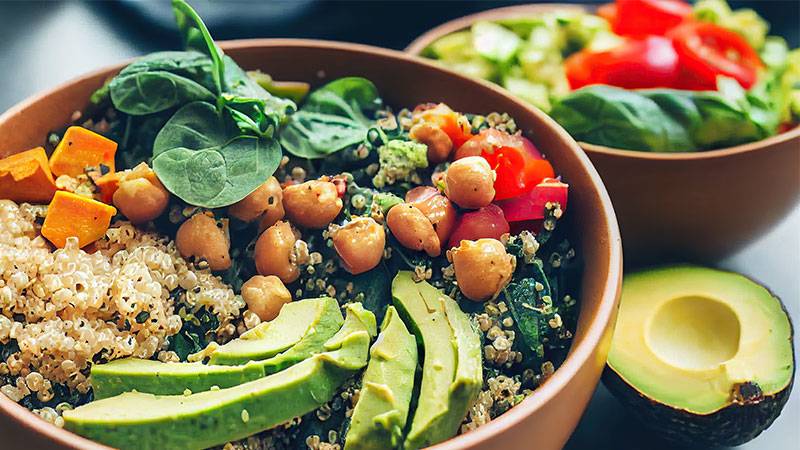
Pescatarian Diet
A Pescatarian Diet, while predominantly plant-based, incorporates fish and seafood, excluding other meats. This focus on marine sources provides essential omega-3 fatty acids, known for supporting heart health and cognitive functions.
From an environmental standpoint, sourcing fish responsibly can be more sustainable than livestock farming, resulting in reduced land use and freshwater consumption. However, the sustainability hinges on choosing species that aren’t overfished and methods that don’t damage marine ecosystems.
When practiced mindfully, a pescatarian diet can strike a balance between nourishing the body with high-quality proteins and minimizing environmental repercussions traditionally associated with meat-centric diets.
Final Thoughts
In my journey towards a sustainable diet, I’ve encountered challenges, yet the profound rewards make every effort worthwhile. Adopting this way of eating has not only benefitted my health but has also allowed me to play a role in nurturing our planet.
Each meal becomes more than just nourishment; it’s a step towards a greener, healthier world. The choices we make daily resonate far beyond our plates, shaping the health of our environment and future generations. I urge you to embark on this fulfilling journey. Start with one change, and let every bite be a commitment to a better world.



